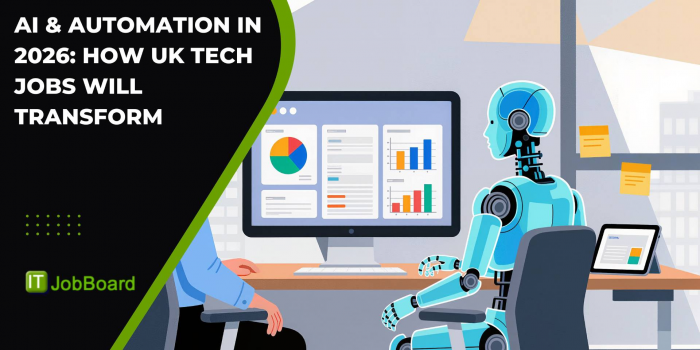Back

Top UK IT Roles with Biggest Salary Growth in 2025 | High-Paying Tech Jobs
09/09/2025

The UK IT Roles Showing the Biggest Salary Growth in 2025
The technology sector in the UK is consistently outpacing nearly all industries when it comes to career possibilities and salary growth. By 2025, companies are heavily investing into areas such as artificial intelligence (AI), cloud infrastructure, block chain development and cybersecurity that is creating exceptional demand for skilled workers. In turn, salaries in these areas have skyrocketed, with some job postings offering six-figure salaries.
1. AI & Machine Learning Engineers
AI and machine learning (ML) are still at the tip of the dictionary in terms of digital newness. From generative AI to hyper-developed automations, providers need specialists to build, train and deploy intelligent models.
Typical starting salary: £45,000
Median advertised salary in London: £87,500
Senior/experienced candidates: up to £120,000.
The increase in starting salaries demonstrates the lack of available talent as both AI and ML have strategic importance in sectors like healthcare, finance and retail.
2. Cloud Engineers
With organizations throwing money into migrating to cloud platforms, the cloud engineer position is becoming increasingly relevant. No corporate enterprise can go without one, so it is great to see decision makers realizing there will soon be a gaping skills/experience gap in the workplace. Knowing AWS, Microsoft Azure and Google Cloud will take you that extra mile to achieve that coveted cloud engineer position.
Average salary: £54,286
Top salary: £144,552
Cloud engineers are the most sought-after IT roles in the UK in Managed Services/Cloud Service Providers and there are increased salaries year-on-year.
3. Blockchain Development Engineers
It is true that while blockchain technology was first adopted in financial services, it is now blossoming in a number of other areas - supply chain, healthcare and government services, for example. Those engineers with blockchain development skills are certainly cashing in.
Starting salary: £65,000
Experienced salary: up to £90,000
The best thing about blockchain roles being some of the highest paying entry-level in UK Tech, is that they are therefore attractive to graduates and career changers alike.
4. DevOps Engineers
DevOps has hit the mainstream of digital transformation. Companies want faster delivery and increased automation, and security in the pipeline, which drives the need for DevOps engineers.
Starting salary: £50,000
Experienced salary: up to £85,000
Salary is being tipped higher due to the strong skills in CI/CD, containerisation (Docker and Kubernetes), and cloud-native development.
5. Full Stack Developers
The demand for full stack developer. While this isn't new, it shows no sign of abating. Employers are keen to find those who have practiced languages like React, Node.js and cloud integration.
Salary: £40,000 - £80,000
The versatility in roles ensures continual salary growth across any industry, especially rapid scaling start-ups.
Other Fast-Growing Roles
Data Scientists & Data Analyst
The data economy is booming and organisations are willing to spend for the right expert that can unlock insights.
Salary: Data Scientist: £45,000 - £85,000 | Data Analyst: £30,000 - £60,000
Cybersecurity Analysts
With cyberattacks increasing in scale and complexity, businesses are investing more in defence.
Salary: Entry Level: £35,000 | Experienced: up to £62,500
5. Skill Demand vs. Skill Gap (Future Outlook)
Future Skill Gap
Reports suggest that by 2026, the UK could face a shortfall of over 200,000 skilled IT professionals. With AI, cybersecurity, and cloud adoption expanding faster than training programs, this gap is expected to widen, making high-demand skills even more lucrative.
Market Insights for 2025
London is still the pay king: Tech professionals in the capital consistently earn the highest median salary.
Remote opportunities: Nationwide hiring has improved access along with giving IT specialists based outside London the opportunity to earn reasonable pay.
Talent shortage = pay growth: More than 50% of all UK companies have reported increasing their salaries in order to retain and attract IT talent.
Global Comparison: While UK salaries are competitive, they still trail slightly behind the US where AI engineers can earn over £150,000 annually. However, UK professionals benefit from more remote and hybrid opportunities, which balance out long-term career prospects.
6. Emerging Roles (Beyond 2025)
Emerging Tech Roles on the Horizon
Apart from the current high-paying jobs, new roles like AI Ethics Specialists, Quantum Computing Engineers, and Edge Computing Developers are gaining attention. These positions may not dominate salaries in 2025 yet, but they are expected to play a major role in shaping the UK’s tech industry by 2030.
Conclusion
By 2025, the UK IT jobs market is flourishing, with the likes of AI engineers, cloud engineers, blockchain developers, DevOps practitioners, and cybersecurity specialists forecasted to lead the growth in salary levels. The high demand for these roles, alongside the scarcity of skills, set against a backdrop of rapid digital transformation, will ensure that these roles will remain the highest paid technology careers in the UK.
Employers are not only looking for technical skills but also problem-solving, communication, and business acumen. IT professionals who can align technical expertise with organisational goals will enjoy faster career progression and salary growth.
If you are job searching, now is the time to focus on developing the skills necessary for these roles - whether through industry recognised professional certification courses, working on hands-on projects or getting advanced study qualifications - to ensure you are in a good position to take advantage of UK tech career development for the long-haul.
UK IT Roles with the Biggest Salary Growth in 2025
- Which UK IT roles have the highest salary growth in 2025?
The fastest-growing salaries are seen in AI & machine learning engineers, cloud engineers, blockchain developers, DevOps engineers, and cybersecurity specialists. - How much do AI and Machine Learning engineers earn in the UK in 2025?
AI engineers typically start at £45,000, with median salaries around £87,500 in London. Senior professionals can earn up to £120,000. - Are cloud engineers among the top-paid IT jobs in the UK?
Yes. Cloud engineers are highly sought after, with average salaries around £54,286 and top salaries reaching £144,552 for experienced professionals. - Why are blockchain development roles so well paid?
Blockchain skills are scarce but in high demand beyond finance, including healthcare, supply chain, and government. Entry-level salaries start at £65,000, making it one of the best-paying beginner roles. - Do DevOps engineers still see strong demand in 2025?
Absolutely. With companies prioritising automation and security, DevOps engineers earn £50,000–£85,000, especially those skilled in CI/CD and cloud-native development. - What is the salary outlook for data scientists in the UK?
Data scientists typically earn between £45,000 and £85,000, while data analysts earn between £30,000 and £60,000, reflecting the UK’s growing data-driven economy. - Is cybersecurity a good career choice in the UK?
Yes. With rising cyber threats, cybersecurity analysts are in high demand, earning £35,000 at entry level and up to £62,500 with experience. - Which UK city offers the highest IT salaries in 2025?
London continues to lead in pay for IT jobs, though remote and hybrid roles have opened opportunities for candidates across the UK. - What skills should job seekers focus on to secure high-paying IT roles?
Key areas include AI/ML, cloud computing (AWS, Azure, Google Cloud), blockchain development, DevOps tools (Docker, Kubernetes), and cybersecurity.
Are UK companies increasing salaries to attract IT talent?
Yes. Over 50% of UK employers have raised salaries and benefits in 2025 to attract and retain skilled IT professionals due to ongoing talent shortages.
FAQs
1. Which IT roles are expected to see the highest salary growth in the UK in 2025?
The roles with the strongest salary growth in 2025 include AI & machine learning engineers, cloud engineers, blockchain developers, DevOps engineers, and cybersecurity specialists. These positions benefit from rapid digital transformation and an expanding skill gap.
2. Why are AI, cloud, and blockchain skills in such high demand in the UK?
UK companies are rapidly adopting AI automation, cloud migration, and blockchain-based systems. Due to a shortage of skilled professionals and the strategic importance of these technologies across industries like finance, healthcare, and retail, salaries continue to rise sharply.
3. What salary range can IT professionals expect in high-demand tech roles?
Entry-level salaries start around £35,000–£50,000 depending on the role, while experienced professionals in AI, cloud, cybersecurity, and DevOps can earn between £80,000 and £144,000. AI engineers can even reach £120,000 at senior levels.
4. Which cities or regions offer the highest IT salaries in the UK?
London remains the highest-paying region for IT roles due to a dense tech ecosystem and enterprise demand. However, 2025 has seen a rise in remote and hybrid work opportunities, giving IT professionals outside London access to competitive pay.
5. What skills should candidates develop to secure top-paying IT jobs in 2025?
Skills in AI/ML, cloud platforms (AWS, Azure, GCP), blockchain development, DevOps tools (Docker, Kubernetes, CI/CD), and cybersecurity are crucial. Employers also value soft skills such as problem-solving, communication, and business understanding for faster career growth.


























































































































